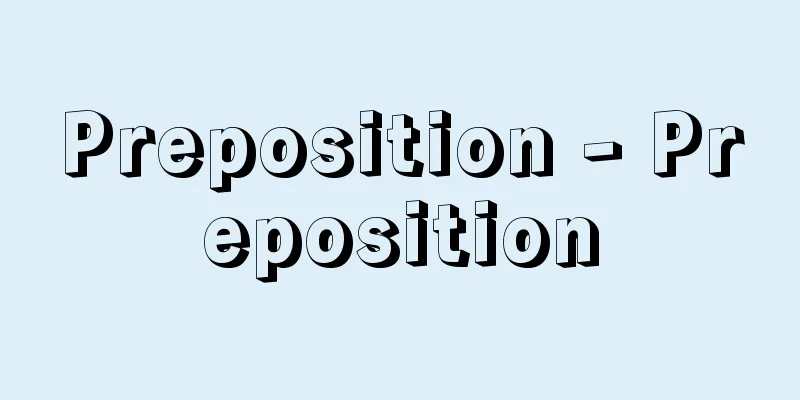Preposition - Preposition

|
…In contrast, a “particle” does not bring about such a concrete image by itself. Its meaning is “empty spirit,” and it helps the function of a real word to convey the speaker’s will or emotion. Examples of this include adverbs, conjunctions, prepositions, and mood particles (some people simply call them “particles”). The scope of “particles” as defined by Japanese Sinologists is even broader, and can even include pronouns (some Chinese scholars have also made a similar theory). … *Some of the terminology explanations that mention "medial words" are listed below. Source | Heibonsha World Encyclopedia 2nd Edition | Information |
|
…これに対して〈虚詞〉は単独ではそのような具体的なイメージをもたらさない。その表す意味は〈空霊〉で,実詞のはたらきを助けて話者の意志または情念を伝達するものであり,副詞や連詞や介詞や語気助詞(単に〈助詞〉と呼ぶ人がある)などがこれに属する。日本の漢学者のいう〈助字〉の範囲はいっそう広く,代名詞などをも含めることがある(中国の学者にも同様の説をなす人があった)。… ※「介詞」について言及している用語解説の一部を掲載しています。 出典|株式会社平凡社世界大百科事典 第2版について | 情報 |
Recommend
Nikaido Yukifuji
Year of death: 22 August 1302 (14 September 1302) ...
Ocean drilling - Kaiyoukussaku
Drilling a well from above the sea surface to belo...
Laurencia pinnata (English spelling)
…[Mitsuo Chihara]. . . *Some of the terminology t...
Saisei Gakusha - Saisei Gakusha
A representative private medical school of the Me...
Turtle ladybug - Turtle ladybug
This insect belongs to the family Coccinellidae i...
Doshi [village] - Doshi
A village in Minamitsuru County in southeastern Ya...
Pipeline - Pipeline (English spelling)
A facility for transporting fluids through pipes....
Fistulariidae
…is a general term for marine fishes of the Fistu...
Snapdragon
...The flower is a gamopetalous flower with two l...
Lollards - The Lollards
A general term for followers of the ideas of Wycli...
Yu-wen Hu (English spelling)
[Raw] Taiwa 19 (495) [Died] Kentoku 1 (572) The po...
Minoru Akita
1905-1977 A manzai comedian from the Showa period...
Hagakure
A book of instruction from the mid-Edo period, a ...
Epidendrum Marie - Epidendrum Marie
…It is widely distributed in Latin American count...
Cannizzaro
Italian chemist. He entered the medical school of...









